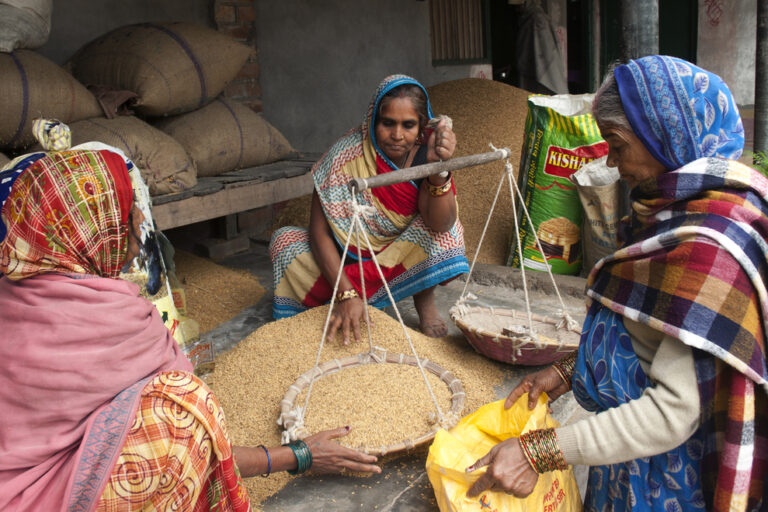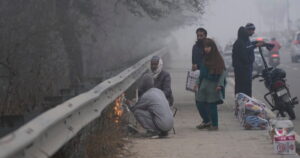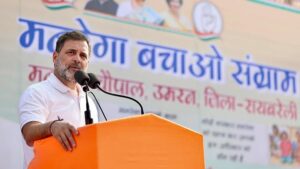A Long Road Ahead For True Gender Equality

It’s been nearly 50 years of celebrating International Women’s Day but the gains for women have been incremental at best and sometimes just plain regressive. Women across Indo-Pacific countries continue to bear the brunt of misogyny, violence and sexism at home, in public and the workplace (Photo © GIZ/Sanjay Austa)
Economic empowerment, targeted legislation and cultural shifts are required to create gender-just societies and restore women’s dignity.
It’s been nearly 50 years of celebrating International Women’s Day but the gains for women have been incremental at best and sometimes just plain regressive.
Women across Indo-Pacific countries continue to bear the brunt of misogyny, violence and sexism at home, in public and the workplace. Australia’s recent report on the gender pay gap is a reminder that economic equality remains distant, even in developed economies.
Beyond celebrating women’s achievements, International Women’s Day offers the opportunity to address obstacles in the path to gender equality through collective action. This year’s theme “Invest in Women: Accelerate Progress” is a timely reminder to examine not just overt but insidious forms of women’s disempowerment: economic, social and political.
The gender pay gap, the unchanging nature of women’s care burden, roadblocks to leadership roles and healthcare access, sexual violence, domestic abuse, precarious working conditions, lack of social protection and inequity that carries into old age all coalesce to deny women their rights to full lives.
Women continue to pay the marriage and motherhood penalty which affects incomes, promotions and employment, largely due to the time spent on unpaid care work — childcare, elder care, cooking and domestic tasks — as compared to men. In most countries, women’s increased presence in the workforce has not been accompanied by men sharing the burden of care work.
Due to their care burden, women are more likely to join informal work in both developed and developing economies. This requires more stringent policies around decent pay, enhanced labour legislation and greater gender sensitivity in workplaces. This is true for all nations, but especially for developing economies, where domestic work is largely unregulated and highly precarious.
For domestic work to be seen as “work” cuts across economic and social considerations for both paid and unpaid domestic work. In workplaces, this would translate into more robust labour legislation that includes maternity benefits, insurance, equal pay and health and safety considerations. At the household level, it means reducing the disproportionate burden of care work on women.
The distribution of high-skilled and low-skilled jobs in labour markets is different for developed and developing economies. In Australia, women have entered the workforce in larger numbers, resulting in job creation for low-skilled work like domestic work and childcare, again largely dominated by women.
Indian data reveals rural women are more economically empowered than urban women, with a sharp increase in women engaged in agricultural work – a symptom of household distress. This throws cold water on the glitzy association between urbanisation and women’s empowerment. There are simply not enough jobs to absorb the educated female labour force.
India has failed spectacularly to address gender inequality in other ways.
Violence against women continues unabated. India’s rape culture has made headlines again, testifying to the licence to commit grievous assault that Indian men have from their elected representatives even as women stand up to male dominance. And no wonder. Convicted rapists are granted remission, celebrated and roam free with impunity. We’ve been here before.
Last week, two minor girls were found hanging in India’s Uttar Pradesh, after being gangraped by a brick-kiln contractor and his relatives at their place of work. This has its foundation in deeply entrenched patriarchal practices and a total absence of social protection.
Economist Amartya Sen’s ‘missing women’ thesis rings truer than ever for India and China, which have the highest rates of female mortality. National Crime Records Bureau data from 2019-21 reveals over 1.33 million women and girls went ‘missing’ in India during that period, exposing their extreme vulnerability despite various legislations and government policies towards gender equality.
Reasons vary from domestic violence, trafficking, infanticide, nutritional neglect of girls, maternal mortality, domestic servitude, and forced marriages.
While countries like Indonesia recorded higher rates of domestic violence in the case of unregistered marriages, being married also means women are discouraged from joining the workforce in developing economies.
Life is no easier for divorced women. A recent notice issued by India’s Ministry of Housing and Urban Affairs requires divorced women to obtain a No-Objection certificate from their husbands to use their maiden surname again. If ministries enshrine gender discrimination in their edicts, can men be far behind?
Maternal and child health is in crisis, alongside sexual and gender-based violence in different conflict zones. Between October- December 2023, women and children accounted for 70 percent of Palestinian deaths. A famine spurred by halting of aid reveals unprecedented rates of preventable maternal and infant mortality due to malnutrition and dehydration.
You can be forgiven for thinking life gets better as you age. The experiences of gender inequity multiply with age. Older women face multiple burdens of poverty, ill health, abuse and abandonment, lack of savings, precarious property ownership and poor mental health.
So what can “Investing in women” look like? It means collective action along multiple fronts.
International Women’s Day is premised on hard-won struggles for women’s suffrage and workers’ rights, for better pay and working conditions. The historical exclusion of women from the fields of health and medicine, politics, STEM and academia plays a significant role in making women’s problems invisible. Governments need to set the balance right urgently.
Son preference remains one of the biggest roadblocks to gender equality in many Asian societies. Societal transformation requires shifts in attitudes, economic investment, giving women leadership roles and economic opportunity, and eliminating barriers that prevent women from being seen as equals.
What is required? Nothing short of a systemic overhaul.
Rwanda has a record number of women legislators in Parliament. This was achieved simply by giving women their rights: a 30 percent quota for women in all decision-making organs of the state, revamping inheritance laws that gave women access to property and increased business opportunity, reinstating their economic power.
To effect change at the national and global level requires addressing the worm eating the rind: the fundamental inequality that operates at the individual and household, which often mimics the actions of states and politicians in power. Traditional gender norms persist at the household, local and national level in most countries and actively impede women’s participation in the workforce.
An economic shift demands a cultural shift towards achieving true gender equality by addressing structural disadvantages through a mix of policy and legislation, gender budgeting, measures to prevent violence, changing mindsets through education and cultural transmission, information and equal opportunity, reducing the digital gender divide, recognition of care-based labour and redistribution of care work.
Any investment in women’s progress remains tokenistic if social and institutional structures do not remove systemic barriers towards creating equitable societies.
Originally published under Creative Commons by 360info™.





